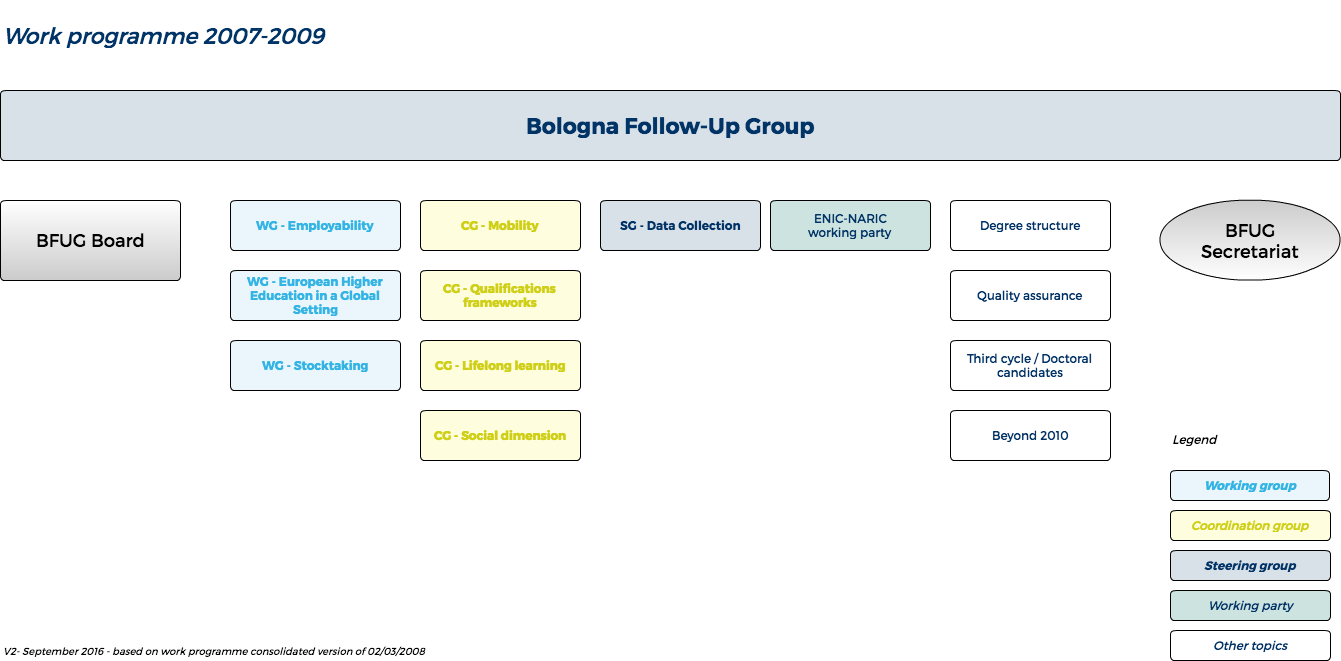Work programme of the Bologna Follow-Up Group 2007-2009
The European Higher Education Area
Building on our rich and diverse European cultural heritage, we are developing an EHEA based on institutional autonomy, academic freedom, equal opportunities and democratic principles that will facilitate mobility, increase employability and strengthen Europe’s attractiveness and competitiveness.
Ministers responsible for Higher Education in the countries participating in the Bologna Process,
London Communiqué, May 2007
Booklet on Bologna Process and EHEA
The overarching aim of the Bologna Process is to create a European Higher Education Area (EHEA) that promotes mobility; attracts students and staff from Europe as well as from other parts of the world; and is internationally competitive. It aims to do this by facilitating greater comparability and compatibility between the diverse higher education systems and institutions across Europe and by enhancing their quality.
- Booklet on Bologna Process and EHEA 2008 - web version
- Booklet on Bologna Process and EHEA 2008 - print version
- Booklet on Bologna Process and EHEA 2008 - professional printing
The Booklet was produced in 2008 produced before Kazakhstan became a member.
The Bologna Process 2007-2010
A European reform process aimed at creating the European Higher Education Area
The overarching aim of the Bologna Process is to create a European Higher Education Area (EHEA) based on international cooperation and academic exchange that is attractive to European students and staff as well as to students and staff from other parts of the world.
The envisaged European Higher Education Area will
- facilitate mobility of students, graduates and higher education staff;
- prepare students for their future careers and for life as active citizens in democratic societies, and support their personal development;
- offer broad access to high-quality higher education, based on democratic principles and academic freedom.
What are the reforms all about?
- Easily readable and comparable degrees organised in a three-cycle structure (e.g. bachelor-master-doctorate): Countries are currently setting up national qualifications frameworks that are compatible with the overarching framework of qualifications for the European Higher Education Area and define learning outcomes for each of the three cycles.
- Quality assurance in accordance with the icon pdf Standards and Guidelines for Quality Assurance in the European Higher Education Area (ESG).
- Fair recognition of foreign degrees and other higher education qualifications in accordance with the Council of Europe/UNESCO Recognition Convention.
Work is also undertaken in areas of broader societal relevance, such as the links between higher education, research and innovation; equitable participation and lifelong learning.
The ongoing reforms will have a strong impact on how European higher education relates to higher education in other parts of the world, which is why Ministers have adopted a icon pdf Strategy for the European Higher Education Area in a Global Setting.
Bologna Follow-up Group
The Bologna Process is taken forward through a work programme that receives orientations from ministerial conferences every two/three years. These conferences are prepared by a Bologna Follow-up Group, which in turn receives input from working groups and seminars.
Oversees the process between the ministerial conferences and is composed of:
- representatives of the 47 countries belonging to the European HIgher Education Area;
- European Commission as additional full member;
- eight consultative members, namely Council of Europe, UNESCO's European Centre for Higher Education, European University Association, European Association of Institutions in Higher Education, European Students' Union, European Association for Quality Assurance in Higher Education, Education International Pan-European Structure, and BUSINESSEUROPE.
The Bologna Follow-up Group (BFUG) meets at least once every six month, is chaired by the country holding the Presidency of the European Union and is supported by a Bologna Secretariat.
Working Groups
To put the objectives and recommendations of the 2007 London Communiqué into practice, the Bologna Follow-up Group (at its meeting of 2-3 October 2007) had adopted a work programme for the period leading up to the Ministerial Conference on 28-29 April 2009 in Leuven and Louvain-la-Neuve.
The overarching aim was to make further progress in realising the European Higher Education Area.

Bologna Work Programme 2007-2009
On the following pages you will find more information on the priorities of the 2007-2009 work programme and the topics covered by the Bologna Process.
- Mobility introductory material 2009 - Coordination Group on Mobility 2007-2009 - Bologna Coordination Group on Mobility Report 2009
- Joint Degrees / Degree structure introductory material 2009 - ECTS Users Guide - 2009
- Employability introductory material 2009 - Working Group on Employability 2007-2009 - Working Group on Employability Report to Ministers 2009
- Recognition of qualifications introductory material 2009 - ENIC-NARIC Networks working party Report to the BFUG on the analysis of the 2007 National Actions Plans for Recognition
- Qualifications Frameworks / Three-Cycle System introductory material 2009 - Coordination Group for Qualifications Frameworks 2007-2009 - Report on Qualifications Frameworks 2009
- Lifelong Learning introductory material 2009 - Coordination Group on Lifelong Learning 2007-2009
- Quality Assurance introductory material 2009
- Doctoral candidates / Third cycle introductory material 2009
- Social Dimension introductory material 2009 - Coordination Group on Social Dimension 2007-2009
- EHEA in a global context introductory material 2009 - Working Group on EHEA in a Global Setting - EHEA in a global context 2009
- Steering Group on Data collection 2007-2009 - Eurostat and Eurostudent Key indicators on the Social dimension and Mobility
- Working Group on Stocktaking 2007-2009 - Bologna Process Stocktaking Report 2009
- Bologna Beyond 2010 introductory material 2009 - Bologna Beyond 2010 (report 2009)
- Independant assessment of the Implementation of the Bologna Process introductory material 2009
Bologna Process between London and Leuven Louvain-la-Neuve
This report, prepared by the Bologna Follow-Up Group Secretariat, focuses mainly on activities carried out under the different action lines in the Bologna work programme 2007-2009.

